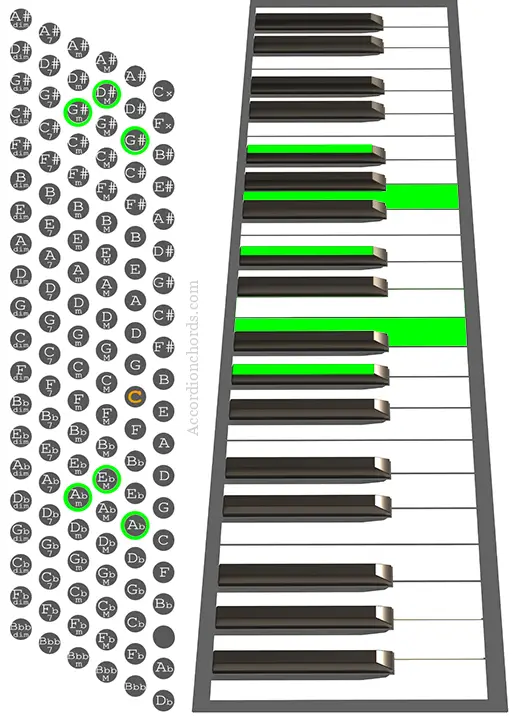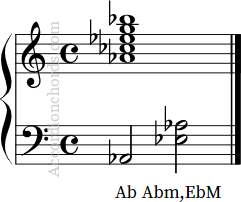AKA: Abm(+7) add2, Abm(+7) add9, Abm(maj7) add2, Abm(maj7) add9, Abm(maj7/9), Abm(Δ9), Abm7+(9), Abmin maj9, AbminorΔ9, AbminΔ9, AbmM7/9, AbmM9, AbmΔ add2, AbmΔ add9
Abm(Maj9) Accordion Chord Chart

m(Maj9) Chords
A m(Maj9) chord is a chord that consists of the root note, a minor 3rd, a perfect 5th, a major 7th, and a major 9th. You can build it also by stacking a minor 3rd on the root, then adding two major 3rd and a minor 3rd on each other.
For example, a Cm(Maj9) chord is made up of the notes C, Eb, G, B, and D which are the root (C), the minor 3rd (Eb), the 5th (G), the major 7th (B) and the major 9th (D). Analyzing the intervals we can see that:
- C-Eb is a minor 3rd,
- Eb-G is a major 3rd,
- G-B is a major 3rd
- B-D is a minor 3rd.
This type of chord is commonly used in jazz and other forms of modern music. It is a minor chord with the addition of a major 7th and a 9th intervals, giving it a unique and complex sound.
m(Maj9) Chords on Accordion
To play a Major 9th chord (Maj9) on a standard bass accordion, you can combine the root note and/or its minor chord with the Major chord built on the 5th interval.
For example, the 5th of C is G. By combining C and/or C minor (C, Eb, G) with G Major (G, B, D), you get Cm(Maj9), which is made up of the notes C, Eb, G, B, and D.

Notes:
A♭, C♭, E♭, G, B♭
(A♭, B, E♭, G, B♭)
Intervals:
R, m3°, 5°, 7°, 9°
Left hand:
A♭ + A♭m + E♭M
(G# + G#m + D#M)
Fingering:
4 + 2 + 3